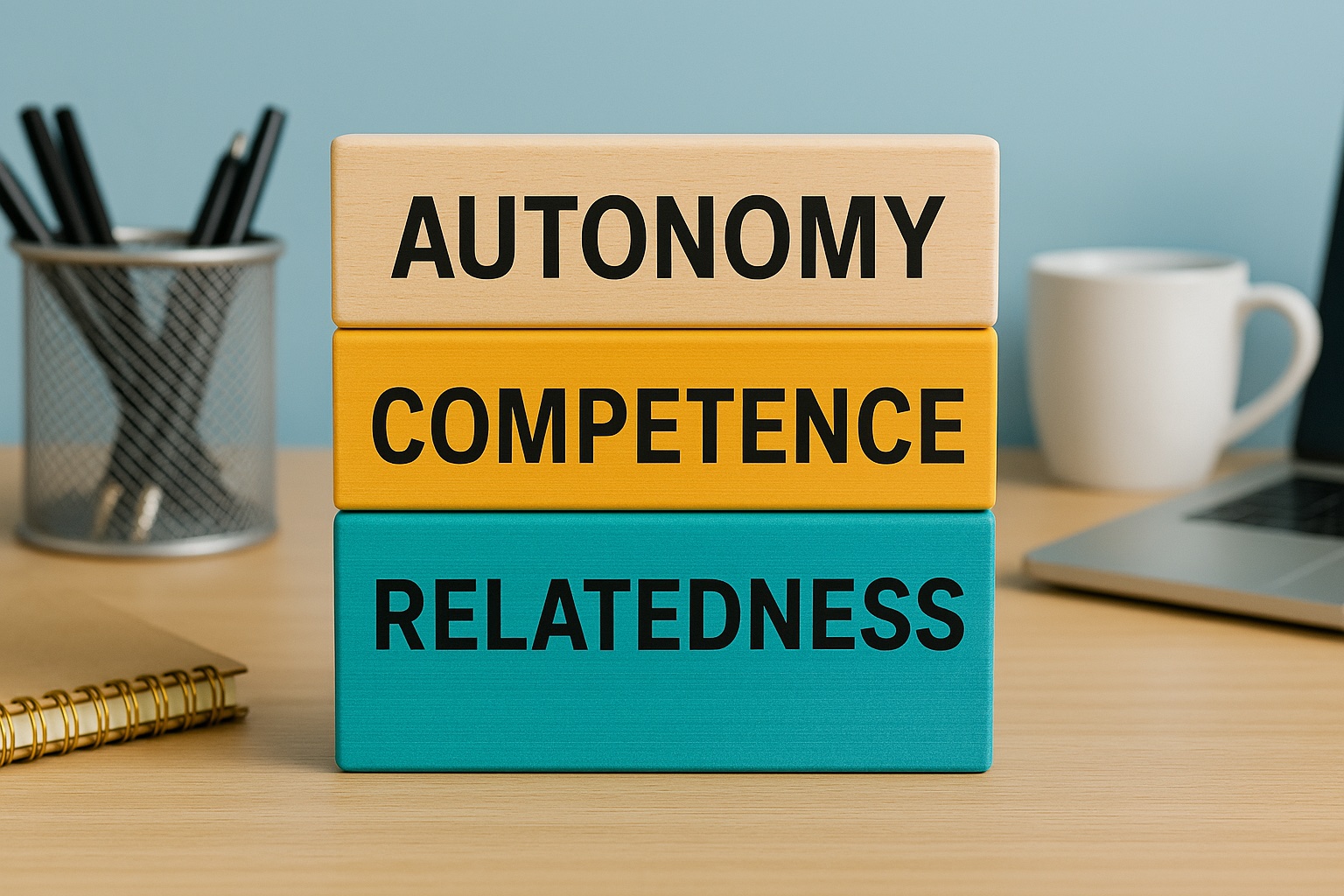Key points
- When people feel free to make choices (autonomy), feel capable (competence) and feel connected to others (relatedness) they are more motivated.
- Specific behaviors that meet these needs make people feel better and more driven. If these needs are not met, people can feel frustrated.
- Context matters. Some ways of supporting people work better in certain situations; but the most important thing is supporting all three needs – autonomy, competence, and relatedness – together. This is the ultimate key to unlocking human potential.
Introduction
Relationships with others play a big role in our lives. Whether it’s a coach, a friend, or a mentor, the support we get from others affects how motivated we are and how well we perform. For example, when someone encourages us or gives us helpful feedback, we feel more motivated, and more confident. These interactions help us grow and perform better in our jobs, at school, or in sports/athletics.
Self-determination theory (Ryan & Deci, 2000) suggests that we have three basic needs to thrive: autonomy (the feeling of a sense of control in your life), competence (feeling capable and skilled) and relatedness (feeling connected and close to others). When these basic psychological needs are supported and met, we are more likely to feel satisfied and fulfilled. In turn, we are more likely to be self-motivated to grow, learn and change our behavior.
Past research has generally found positive relationships between the support for our basic needs, motivation, wellbeing and performance. However, most research tends to have a heavier emphasis on autonomy supportive behaviors and not the other basic needs. As such, Slemp and colleagues (2024) offers an updated, comprehensive (i.e., 4,561 effect sizes from 881 independent samples, total N = 443, 556) investigation to answer the following four questions:
- How do supportive behaviors that meet our three basic needs affect motivation, wellbeing and performance?
- Do these relationships change in different cultures, in different settings, or based on who’s giving the support?
- Do competence and relatedness support matter as much as autonomy support?
- Does support from different people (bosses, peers, family) add up in helpful ways?
Supported needs lead to better outcomes
While intuitive, the first set of findings supported prior research. Results showed that when people felt support in their all three needs, they were more satisfied and less frustrated. This also improved their well-being and performance, although the effect on performance was smaller.
Our context can change things
This study specifically examined how results varied by culture, sources of support, and the research setting. They found the following:
- Cultural Variations. Autonomy support was weaker in more individualistic cultures. In contrast, relatedness support had a stronger effect in more collectivistic cultures.
- Sources of Support. Support from people in authority or vertical support (e.g., supervisors, teachers, parents, etc) had strong positive effects compared to support from peers or lateral support (e.g., peers, colleagues, siblings, etc). While both types of support are important, lateral support added extra value, beyond vertical support. Different Settings. In the workplace, when managers offered autonomy and competence support, it boosted employee engagement and performance. In educational settings, student motivation was significantly improved when teachers provided structured feedback (a competence support behavior) and fostered a sense of belonging (a relatedness support behavior). In healthcare, patients benefited from practitioners supporting their autonomy and competence. Lastly, in sports and coaching contexts, athletes realized greater performance gains with coaches who supported all three needs.
The power of three
Even after considering autonomy support, competence and relatedness support made a big difference in predicting motivation, wellbeing, and performance. This emphasizes the need to support all human needs, rather than focusing too much on one.
Key Points for Practice
- Support people’s need for autonomy, competence and relatedness to improve motivation, well-being and performance. Focusing on all three will yield the best outcomes, be it at work, in school, or in sports.
- Peer support is powerful and should be a critical element in interventions or programs. For example, in organizations, teamwork, mentoring and peer network should be planned and architected not left to chance. In education, especially with technology shaping social interactions, fostering positive peer relationships from a young age is crucial.
- Lastly, cultural differences matter. Recognize that expressions of autonomy, competence, and relatedness may vary across cultures. As such, tailoring interventions to align with cultural values and norms, would ensure relevance and effectiveness.
Final Thoughts
When we intentionally support the basic human needs of autonomy, competence, and relatedness, we unlock the true potential in ourselves and others. Slemp et al. (2024) reveal when all three needs are nurtured, motivation soars, well-being flourishes, and performance elevates to new heights. Whether in the workplace, classroom, on the field, or in life, the power of meaningful support—especially through peer connections—can transform lives. By embracing the full spectrum of human needs and honoring cultural and relational differences, we can create environments where everyone can achieve their best.
Trustworthiness score:
The trustworthiness of the study is high (90%) as it’s based on a meta-analysis comprised of non-randomzied-controlled and/or before-after studies. This means there is a 10% chance that alternative explanations for the effects found are possible.
Learn how we critically appraise studies to assign them a Trustworthiness Score
We aim to provide you only the best available scientific evidence to inform your decisions.
References
- Slemp, G.R., Field, J.G., Ryan, R.M., Former, V.W., Van den Broeck, A., & Lewis, K.L. (2024). Interpersonal supports for basic psychological needs and their relations with motivation, well-being, and performance: A meta-analysis. Journal of Personality and Social Psychology: Interpersonal Relations and Group Processes, 127, 5, 1012 – 1037. https://doi.org/10.1037/pspi0000459
- Ryan, R. M., & Deci, E. L. (2000). Self-determination theory and the facilitation of intrinsic motivation, social development, and well-being. American Psychologist, 55(1), 68–78. https://doi.org/10.1037/0003-066X .55.1.68











